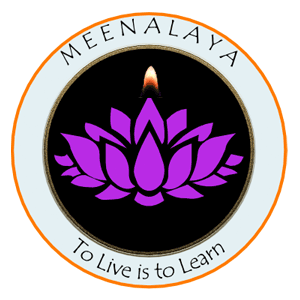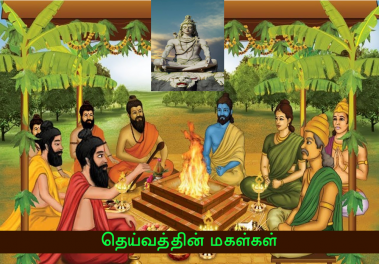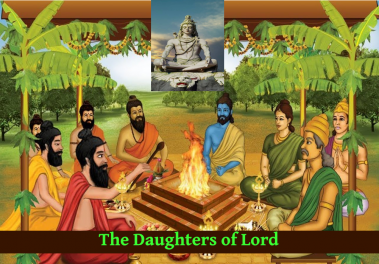Lullaby
Conversation with Aiya (5)
‘Great news, Rajja’, said Ramji on the phone. When that call came from India, I was with Aiya in a car,
‘Hello Ramji’
‘Sowmya got a baby-girl… both mother and child are well’, said Ramji.
His joy was evident in his voice. I too shared the happiness and inquiries in that brief conversation.
Aiya was sitting with his eyes closed.
I was driving to London Heathrow airport to see off Aiya to India.
‘Aiya, it is great news. Sowmya is my niece in Seattle. Her mother and my wife are sisters. It is the first child for Sowmya! Splendid news! As I still see her as a child, I am in awe at the thought, a child for a child’
‘It is good news indeed. That too a daughter, splendid’, said Aiya.
‘Yes Aiya, hopefully there are few more such good news in the waiting… .’.
When I said, I was thinking about other nieces, Deepa, Akshaya et al.
‘To tenderly carry a child within and deliver safely is a supremely divine act. That is why motherhood is so special and deemed divine; especially in our culture, mothers hold an esteem position’ said Aiya.
‘Certainly Aiya, during pregnancy, both their mind and mind are brimming with the load of immense love; indeed, they are in the hands of the God for the whole process of delivery! And of course, the endearing nurturing and lullabies….’
Aiya interrupted to say, ‘Lullabies…. Those are known as ThAlAtu in Tamil; ThAlAtu is a great lesson and a great gift, don’t you know?’
‘Lullabies are generally to calm the babies to sleep, that I know. Also ThAlAtu in India, I believe, is mainly sung in the country side.’
I said these words with some hesitation.
Aiya laughed before continuing.
‘ThAlAtu is not just an ordinary matter; it is not to be simply ignored as some folk-song. ThAlAtu has a great heritage. Sometimes I wonder, perhaps mothers these days are not very appreciative and don’t sing ThAlAtu. If it is so, then it would be a great loss!’ Aiya lamented.
‘Why so Aiya…. In this fast-paced world, who has time for such things!’
‘Do not say that, it would be wrong. ThAlAtu is the true mother-tongue. It is the means by which a mother, as the very first teacher, imparts knowledge and love to the child. ThAlAtu also gives solace, peace and greater wisdom to the parent also.’
I interrupted.
‘How can it be Aiya? Making sounds like lululAi, ArArO etc. do get the attention of the babies and calm them to sleep. These days, there are lots of toys and gadgets that can generate such soothing melodies. Seem like a better alternative to ThAlAtu.’
Aiya looked intensively at me.
‘Not so…. such soothing noise is only like a prelude, sort of pallavi in the Indian classical music. There is more to it. Firstly, lululAyi and such noises are made by twisting and rolling our tongue. In Tamil, the word “ThAl” means tongue and “Attu” means to roll. So ThAlAtu means rolling of tongue. I believe it is said as “ThArAtu” in Malayalam. Noises made that way, do bring some calming effect on the babies. But ThAlAtu intertwines great thoughts into these soothing melodies.’
I was thinking of an old ThAlAtu, which goes something like: ‘yAr adichu nI azhuVE – mAman adichchArO – malligaipU koNduvara’.
Aiya continued.
‘ThAlAtu in English is known as “lullaby”; in Kannada, it is “jo jo” and “uiyAlu” in Telugu. It is a universal concept. In our culture, ThAlAtu attained a status of unique literature. Great spiritual seers, AlwArs and NAyanmArs had rendered so many beautiful ThAlAtu in praise of the Lord, so wonderful and poignant, you know!’, exclaimed Aiya.
I too recalled few lines of a beautiful verse by Alwar.
“mAnikkam katti vayiram idai katti – AnipponnAR ceitha vaNNach chiru thottil – pENi unakkau bhiraman vituth thanthAn – maNi kuRaLanE thaalElO”
Aiya continued.
‘In Tamil Nadu, many great scholars have contributed to bring the status of ThAlAtu into a special form of literature. Those are not just on gods; thy include folk-stories, history, geography, social justice etc. . Poets like BhArathiyAr and BhAratidAsan had also used this form of literature to impart awareness.’
The car was approaching the airport.
‘Aiya, surely this is quite interesting. But besides calming the babies to sleep, is there any use? Are the babies, in their primitive stage of life, capable of understanding the true import of the songs? Do they have such intellect?’ I asked.
Aiya was in deep thoughts for couple of minute.
‘Do you think that we always understand using our intellect? If you think so, it is a wrong idea’, said Aiya.
‘How Aiya! To understand anything, one must have the intelligence’
‘Yes, to understand something, one needs intelligence. But even before that, one must have a capacity to register something for that to be subsequently understood’
‘Yes Aiya’, I said.
‘Registering an experience is not due to intelligence, as in your common definition. It is because of another, fundamental power – cognizance. Only that which has been registered can be subjected to further scrutiny with intellect. The scrutiny and the resulting reflection in terms of our expression of thoughts and actions define our “intellect” and “ability”. So, scrutiny and performance, based on intellect and ability are possible only when preceded by the power of cognizance.’
‘Is not cognizance a form of intelligence?’
‘No, it is the power of the Self, for being aware; it is the seed of all intelligence. It is the power that captures everything that feeds our senses into our consciousness; it registers them as impressions. This power exists naturally in all life forms’
‘That means, babies are able to register whatever we sing or speak, is so?’
‘Indeed so! It applies to all of us. Like a mirror which holds within everything that is in front, the power of cognizance take all and register in our chittam. Of course, we do not usually access everything in the chittam with our manas.’
‘What is the difference between manas and chittam?’
‘Well, let us not dwell too deep on this. Simply, consider manas as the faculty that thinks and desires, while chittam is the faculty that maintains the impressions due to cognizance. Our scriptures say that chittam is quite deep. It stores all impressions – not just recent or from this life alone, but also from all previous births.’
That means, in the chittam of babies, experiences of ThAlAtu are registered, but not really accessed by their manas as they grow. Is that so?’
‘Correct. When a mind can access and download the impressions, those are fed to the intellect for scrutiny and ability for the performance. Only such “downloading” and “processing” capabilities define our intellect and abilities. To “upload” into our chittam is an entirely different, intrinsic and native process.’
‘mm… what is the point of registering all in the chittam’
‘Plenty, chittam is our treasure-chest; it is our power-tool box. It is accessible through contemplation. It reveals by itself too. This means, we can access and import these hidden impressions. Vedanta vouches for this. Even science proves this. For example, when one is under hypnosis, he is able to reveal so many impressions, even though those were never known to his intellect before. ‘
I was surprised, as Aiya continued.
‘That is why, no matter what the language is, the conversation and lullabies of mothers are naturally ingested and registered by the babies. Those impressions in the early life of the babies are the most important treasures; those are the building blocks. Therefore we must take it upon us as parent to deposit right impressions. ThAlAtu is the poignant tool for this goal’
By then, we had reached the airport. I stopped the car and Aiya remained on the seat and continued.
‘ThAlAtu can be used even when the baby is in the mother’s womb. You know the story of Prahalada, who was fed great knowledge and devotion by his mother, even when he was in her womb. However, to calm the babies to sleep, generally ThAlAtu is sung for babies when they are from three months old.’
I thought for while. Is ThAlAtu appealing to the modern-day mothers? Younger generation mothers, with their identification of modernity with English and western cultures, may not see ThAlAtu as a necessary means of bonding with their children. Can they understand the purpose and meaning of ThAlAtu?
As if knowing my thoughts, Aiya said.
‘It is not important that one must understand ThAlAtu. It is enough to register the bond and create the impression in the chittam. ThAlAtu makes the babies to sleep and that is a fact. But the greater truth is that a good ThAlAtu also give true awakening! It benefits both the baby and the parent.’
‘Yes Aiya, it is a compelling thought. I shall share this with those I know and to whom it may be relevant and serve them well. Aiya, is there a specific type of ThAlAtu that you recommend?’
‘There are many ThAlAtu. Surely a search on the Internet would give plenty of choices…. legends, folk-stories, moral and social justice etc. Such songs, irrespective of the language – Tamil, Sanskrit etc. – should help. Of course, if one knows the meaning and sing, so much better.’
Aiya continued.
‘But if you ask a person like me who follows Vedanta, then the type of ThAlAtu should include the likes of what MadAlasa – whom Swami Vivekananda had quoted from the puruana as the mother-of-mothers! Her motive was to impart the ultimate truth to the baby and so she makes astonishing assertions such as “you are eternal, you are atman, and you are the truth” etc. Knowledge of the Self is supreme and in my view it would be the greatest service that a parent can do for the child.’
Aiya then said, ‘In any case, we are going to indulge with the child, asking “show me where you are, show me your eye” etc. giving an impression that body is its identity. As it grows, by asking questions such as “what do you want to do, who do you want to become, a doctor? Engineer?” etc., we make the child to believe that it has to become something other than what it is right now. Such imposed constraints and resulting ordeals will suffocate the child and someday in its life, it will long for the truth.’
‘If the true knowledge about the Self is already ingested within, mere longing will reveal the impressions, for it to be downloaded and comprehended. That is why ThAlAtu is a great tool to equip the child with the safe-deposit of true knowledge. Every responsible parent should pursue this. So perhaps you may ask to sing ThAlAtu.’
Saying thus, Aiya took his luggage and walked towards the Airport. I saw him off and turned the car back. On the way, I contemplated on his words; I scribbled whatever came to my mind into a ThAlAtu in Tamil. (See the attached). I must email this to those who I know may find it relevant; if not as a gift, it may give some food for thought.
Thinking thus, I drove back home.
Mee. Rajagopalan
04 November 2014






